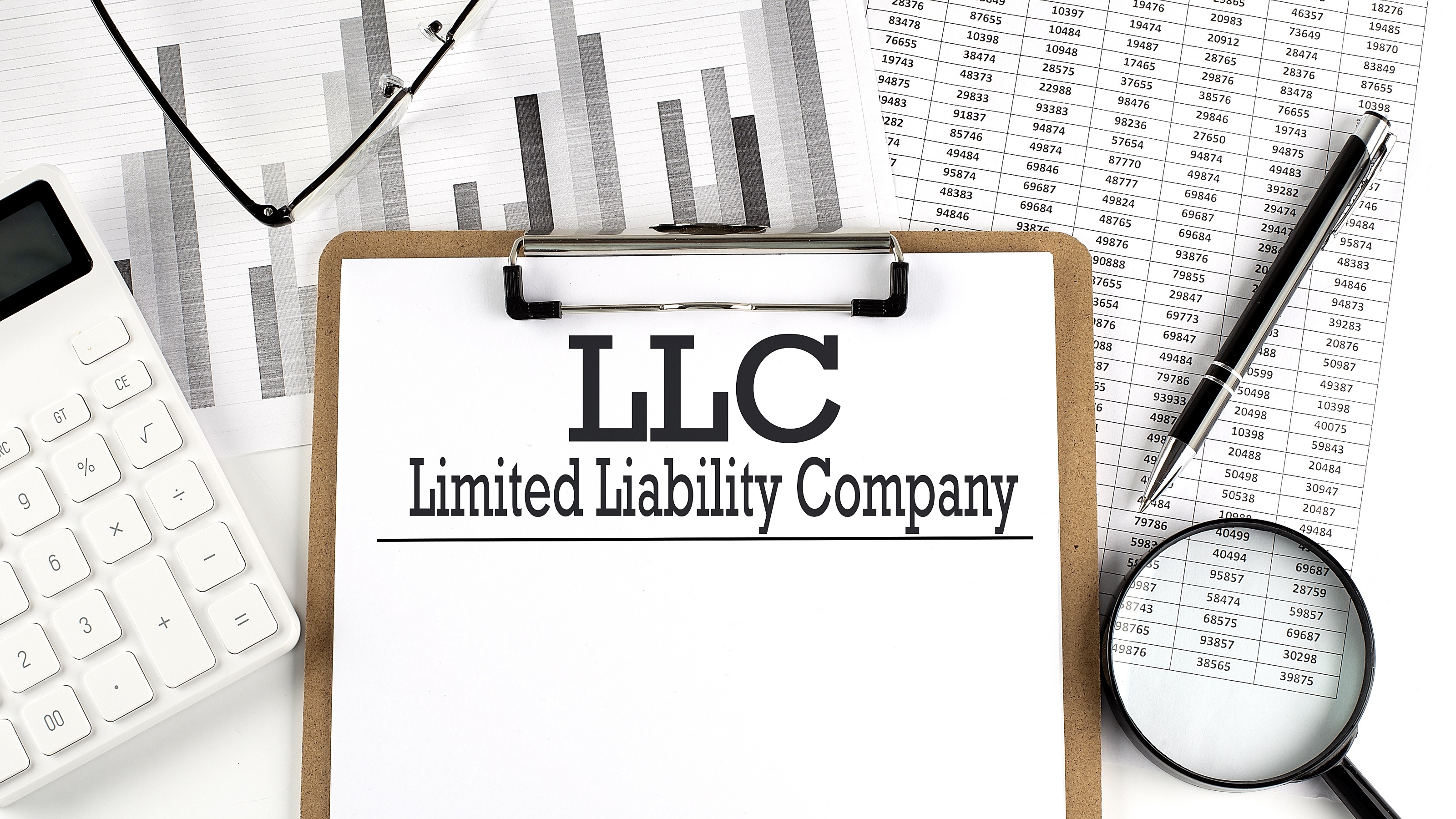Limited Liability Companies (LLCs): How Assets Are Protected
An LLC can prevent problems with assets within the LLC from affecting assets outside the LLC, but there are limits to asset protection.


Profit and prosper with the best of Kiplinger's advice on investing, taxes, retirement, personal finance and much more. Delivered daily. Enter your email in the box and click Sign Me Up.
You are now subscribed
Your newsletter sign-up was successful
Want to add more newsletters?

Delivered daily
Kiplinger Today
Profit and prosper with the best of Kiplinger's advice on investing, taxes, retirement, personal finance and much more delivered daily. Smart money moves start here.

Sent five days a week
Kiplinger A Step Ahead
Get practical help to make better financial decisions in your everyday life, from spending to savings on top deals.

Delivered daily
Kiplinger Closing Bell
Get today's biggest financial and investing headlines delivered to your inbox every day the U.S. stock market is open.

Sent twice a week
Kiplinger Adviser Intel
Financial pros across the country share best practices and fresh tactics to preserve and grow your wealth.

Delivered weekly
Kiplinger Tax Tips
Trim your federal and state tax bills with practical tax-planning and tax-cutting strategies.

Sent twice a week
Kiplinger Retirement Tips
Your twice-a-week guide to planning and enjoying a financially secure and richly rewarding retirement

Sent bimonthly.
Kiplinger Adviser Angle
Insights for advisers, wealth managers and other financial professionals.

Sent twice a week
Kiplinger Investing Weekly
Your twice-a-week roundup of promising stocks, funds, companies and industries you should consider, ones you should avoid, and why.

Sent weekly for six weeks
Kiplinger Invest for Retirement
Your step-by-step six-part series on how to invest for retirement, from devising a successful strategy to exactly which investments to choose.
Editor’s note: This is part 13 of an ongoing series about using trusts and LLCs in estate planning, asset protection and tax planning. The effectiveness of these powerful tools — especially for asset protection and tax planning — depends very much on how they are configured to work together and whether certain types of control over assets and property are surrendered by the property owner. See below for links to the other articles in the series.
Limited liability companies (LLCs) are business entities that can be used as powerful asset protection tools and as “disaster containment units.” LLCs avoid cross-liability where a lawsuit against one asset causes problems with a different asset. LLCs that hold assets function in a similar manner to an egg carton — egg cartons and LLCs both keep a problem (a broken egg or perhaps a rental property subject to a lawsuit) from spilling onto the other assets of the LLC owner.
However, LLCs only protect against liabilities originating from activities conducted inside of the LLC — they do not protect from liabilities originating from outside of the LLC. For example, if the LLC owner is sued for personal activities, the LLCs themselves are subject to the claims. In short, LLCs are essential to get half of the asset protection that most people are seeking, but LLCs must be coupled with asset protection trusts to get full protection.
From just $107.88 $24.99 for Kiplinger Personal Finance
Become a smarter, better informed investor. Subscribe from just $107.88 $24.99, plus get up to 4 Special Issues

Sign up for Kiplinger’s Free Newsletters
Profit and prosper with the best of expert advice on investing, taxes, retirement, personal finance and more - straight to your e-mail.
Profit and prosper with the best of expert advice - straight to your e-mail.
LLCs are a creation of state law — formed using the statutes of a state chosen by the LLC owners or members. LLCs are formed at a state level by filing certificates or articles of organization with a secretary of state or state business division. LLCs also require several federal filings, such as obtaining a tax identification number with the IRS, also known as an EIN. As of this year, under the Corporate Transparency Act (CTA), nearly all LLCs must also complete beneficial ownership information reporting (BOIR) with the Financial Crime Enforcement Network (FinCEN).
Multimember LLCs vs single-member LLCs
If an LLC has more than one owner, it is a multimember LLC and will almost always need to file an annual Form 1065 partnership return with the IRS. A single-member LLC is not required to file a tax return of its own, although the income and expenses must be reported on Schedule C or Schedule E as part of the LLC owner’s personal Form 1040 tax return. Although it may be tempting to set up an LLC as a single-member entity to avoid filing a partnership return, it is important to note that the multimember LLC is afforded more asset protection under most U.S. state LLC laws than the lesser protection afforded to single-member LLCs.
To protect against vicarious liability, LCCs, like egg cartons, should be structured with dividers between the assets titled into the LLC for holding. Otherwise, the properties inside of an LLC could bump into one another and break — causing vicarious problems for one another. Similarly, holding multiple properties inside of just one LLC subjects all of the properties to vicarious cross-liability. For example, if a problem happens with one LLC property, it can impact any other properties held inside of the same LLC. The best solution to protect against vicarious liability between properties is to form several LLCs, with each LLC holding different properties. To illustrate the benefits and asset protection of LLCs, consider an example of an LLC providing asset protection:
Example. A rental real estate owner wants asset protection, so they form several LLCs to hold their different properties and then deed the rental real estate properties into the LLCs. Later, the renter of one of the LLC properties files litigation against the LLC due to an injury that the renter incurs on the property. The LLC acts as a disaster containment unit, and the renter’s claims cannot move upstream to the real estate owner or impact the other rental properties. The renter filing the lawsuit is limited to recovery against the single rental property owned by the LLC, and the renter can also recover against the LLC’s property insurance policy. The other assets and other rental properties owned by the rental real estate owner are segregated away from the LLC rental property subject to litigation.
Asset protection is limited with LLCs
Sometimes, owners of real property or other assets mistakenly believe that they have fully protected themselves by transferring property into an LLC. Although LLCs are an essential tool in asset protection, LLCs must be used in conjunction with a trust because LLCs provide only “half” of the asset protection that property owners are hoping to achieve. An LLC will protect the owners of the LLC from a liability that originates “inside” of the LLC, but the LLC is not protected against a claim originating from “outside” of the LLC.
Mistaken beliefs about the type of asset protection provided by LLCs usually come from foundational misunderstanding and confusion of the direction from which legal claims can originate, so now consider an illustration of upstream vs downstream attacks against LLCs:
Example. An insurance professional set up an LLC to protect themselves from the liabilities associated with a rental real estate property, and later the professional is personally named in a lawsuit. Notice that this lawsuit doesn’t originate from the rental or from inside of the LLC, but from outside of the LLC — so it is against the professional who is the owner of the LLC, but it is not against the LLC. To make sure this is clear, it is worth pointing out that the lawsuit originates from a claim that has nothing to do with the LLC. Afterward, the plaintiff who filed the lawsuit wins, and the insurance agent who loses the lawsuit tells the winning plaintiff: “Too bad you’ll never get anything out of me because I own everything in LLCs.” The winning plaintiff then demands that the insurance agent turn over their LLC records so that the winning plaintiff can take over the LLCs. The insurance agent who owns the LLC was mistaken in their belief that they have full asset protection from the LLCs and is shocked to learn that a plaintiff in a personal lawsuit can recover against any property they personally own, including the insurance agent’s ownership in LLCs.
Beware of personal lawsuits
The purpose of this example is not to warn people away from LLCs. In fact, LLCs are powerful asset protection tools and provide unique protection that no other legal structures can provide, but LLCs are limited to protecting the LLC owners against liabilities that originate inside the LLC from coming upstream to harm the LLC owner. Put differently, the person in control of the LLC puts the LLC at risk of loss when facing a personal lawsuit.
Perhaps because LLCs are marketed as an asset protection panacea, LLC owners are unaware of the limits of LLCs as asset protection power tools. The failure of an LLC to protect against personal lawsuits highlights a foundational concept in asset protection, which is: You cannot be sued for what you don’t own. Because an LLC must be owned, savvy estate planners often create asset protection trusts to own the LLCs. After all, trusts have trustees and beneficiaries but no owner. Once an LLC is owned by a trust, the LLC no longer has a human owner to personally sue.
My next article will be about combining LLCs and domestic asset protection trusts.
Other Articles in This Series
- Part one: To Avoid Probate, Use Trusts for Estate Planning
- Part two: How Quitclaim Deeds Can Cause Estate Planning Catastrophes
- Part three: Revocable Trusts: The Most Common Trusts in Estate Planning
- Part four: With Irrevocable Trusts, It’s All About Who Has Control
- Part five: Ins and Outs of Domestic Asset Protection Trusts (DAPTs)
- Part six: Irrevocable Trusts: Less Control Equals More Asset Protection
- Part seven: Should You or the Trust Pay a Trust’s Income Taxes?
- Part eight: How to Handle Irrevocable Trust Assets Tax-Efficiently
- Part nine: Repeal the Death Tax? These Are the Taxing Trade-Offs
- Part 10: Gift and Estate Tax vs Capital Gains Tax: Which Is Less?
- Part 11: This Double-Dip Trust Benefit Really Is Too Good to Be True
- Part 12: This Trust Strategy Can Reduce Your Taxes Big-Time
Profit and prosper with the best of Kiplinger's advice on investing, taxes, retirement, personal finance and much more. Delivered daily. Enter your email in the box and click Sign Me Up.

Rustin Diehl advises clients on tax, business and estate planning matters. Rustin serves as an adjunct professor, frequent speaker and is current or former chair of professional associations. Rustin is a prolific author and has published many technical and popular articles on estate and business issues, as well as drafting and advising legislators in developing numerous statutes pertaining to trust and estate and business planning, creditor exemption planning and digital asset (blockchain) trusts and blockchain entities known as decentralized autonomous organizations.
-
 Stocks Sink With Alphabet, Bitcoin: Stock Market Today
Stocks Sink With Alphabet, Bitcoin: Stock Market TodayA dismal round of jobs data did little to lift sentiment on Thursday.
-
 Betting on Super Bowl 2026? New IRS Tax Changes Could Cost You
Betting on Super Bowl 2026? New IRS Tax Changes Could Cost YouTaxable Income When Super Bowl LX hype fades, some fans may be surprised to learn that sports betting tax rules have shifted.
-
 How Much It Costs to Host a Super Bowl Party in 2026
How Much It Costs to Host a Super Bowl Party in 2026Hosting a Super Bowl party in 2026 could cost you. Here's a breakdown of food, drink and entertainment costs — plus ways to save.
-
 Stocks Sink With Alphabet, Bitcoin: Stock Market Today
Stocks Sink With Alphabet, Bitcoin: Stock Market TodayA dismal round of jobs data did little to lift sentiment on Thursday.
-
 Your Adult Kids Are Doing Fine. Is It Time To Spend Some of Their Inheritance?
Your Adult Kids Are Doing Fine. Is It Time To Spend Some of Their Inheritance?If your kids are successful, do they need an inheritance? Ask yourself these four questions before passing down another dollar.
-
 The 4 Estate Planning Documents Every High-Net-Worth Family Needs (Not Just a Will)
The 4 Estate Planning Documents Every High-Net-Worth Family Needs (Not Just a Will)The key to successful estate planning for HNW families isn't just drafting these four documents, but ensuring they're current and immediately accessible.
-
 Love and Legacy: What Couples Rarely Talk About (But Should)
Love and Legacy: What Couples Rarely Talk About (But Should)Couples who talk openly about finances, including estate planning, are more likely to head into retirement joyfully. How can you get the conversation going?
-
 How to Get the Fair Value for Your Shares When You Are in the Minority Vote on a Sale of Substantially All Corporate Assets
How to Get the Fair Value for Your Shares When You Are in the Minority Vote on a Sale of Substantially All Corporate AssetsWhen a sale of substantially all corporate assets is approved by majority vote, shareholders on the losing side of the vote should understand their rights.
-
 Dow Leads in Mixed Session on Amgen Earnings: Stock Market Today
Dow Leads in Mixed Session on Amgen Earnings: Stock Market TodayThe rest of Wall Street struggled as Advanced Micro Devices earnings caused a chip-stock sell-off.
-
 We're 62 With $1.4 Million. I Want to Sell Our Beach House to Retire Now, But My Wife Wants to Keep It and Work Until 70.
We're 62 With $1.4 Million. I Want to Sell Our Beach House to Retire Now, But My Wife Wants to Keep It and Work Until 70.I want to sell the $610K vacation home and retire now, but my wife envisions a beach retirement in 8 years. We asked financial advisers to weigh in.
-
 How to Add a Pet Trust to Your Estate Plan: Don't Leave Your Best Friend to Chance
How to Add a Pet Trust to Your Estate Plan: Don't Leave Your Best Friend to ChanceAdding a pet trust to your estate plan can ensure your pets are properly looked after when you're no longer able to care for them. This is how to go about it.